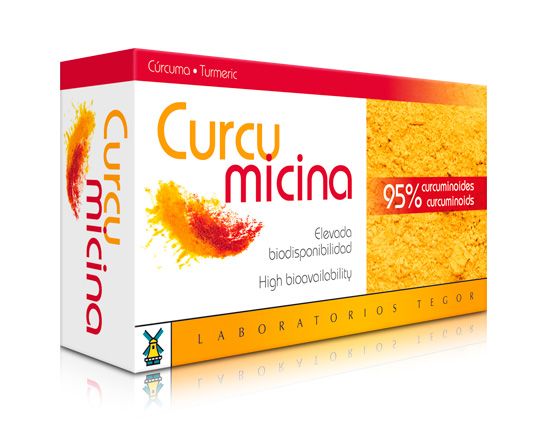

Extracto seco de Cúrcuma estandarizado al 95% en curcuminoides.
Suplemento natural con acción beneficiosa para el aparato digestivo, sistema osteoarticular, sistema nervioso y aparato cardiovascular. Con acción preventiva frente a los procesos oxidativos.
Composición
- Cúrcuma (Curcuma longa) exto. seco estandarizado al 95% de curcuminoides, 350 mg.
- Aditivos, c.s.p.
Modo de empleo
Tomar una o dos cápsulas al día.
Presentación
60 cápsulas.
Acción
| ANTIOXIDANTE | REGULADOR EPIGENÉTICO NATURAL | ANTITUMORAL | ANTIINFLAMATORIO |
|---|---|
|
|
| DIGESTIVO | HEPATOPROTECTOR | COLERÉTICO | CARDIOPROTECTOR |
|
|
| NEUROPROTECTOR | |
|
Bibliografía
- WHO Monograph Rhizoma Curcumae Longae. In: WHO monographs on selected medicinal plants, vol 1 Genf 1999;115-124.
Bruneton J. Farmacognosia. Fitoquímica. Plantas medicinales 2ª Ed. Ed. Acribia. - Subash C Gupta, Sridevi Patchva, Wonil Koh, and Bharat B Aggarwal. Discovery of Curcumin, a Component of the Golden Spice, and Its Miraculous Biological Activities. Clin Exp Pharmacol Physiol. 2012 Mar; 39(3
- Aggarwal BB, Kumar A, Aggarwal MS, Shishodia S. Curcumin derived from turmeric (Curcuma longa): a spice for all seasons. In: Preuss H, ed. Phytopharmaceuticals in Cancer Chemoprevention. Boca Raton: CRC Press; 2005:349-387. http://www.agrawal.org/PDF/Curcumin-Season-Bw1.pdf
- Chainani-Wu N. Safety and anti-inflammatory activity of curcumin: a component of tumeric (Curcuma longa). J Altern Complement Med. 2003;9(1):161-8.
- Araujo CC, Leon LL. Biological activities of Curcuma longa. Mem Inst Oswaldo Cruz. 2001;96(5):723-8.
- Sharma RA, Gesher AJ, Steward WP. Curcumin: the story so far. Eur J Cancer 2005;41(13):1955-1968.
- Gul N, Mujahid TY, Jehan N et al. Studies on the antibacterial effect of different fractions of Curcuma longa against urinary tract infection isolates. Pakistan Journal of Biological Sciences 2004;7(12):2055-2060.
- Rajakrishnan V, Viswanathan P, Rajasekharan KN et al. Neuroprotective role of curcumin from curcuma longa on ethanol-induced brain damage. Phytother Res. 1999;13(7):571-4.
- Ramirez-Bosca A, Soler A, Gutierrez MA et al. Antioxidant Curcuma extracts decrease the blood lipid peroxide levels of human subjects. Age 1995;18:167-169.
- Hong J, Bose M, Ju J et al. Modulation of arachidonic acid metabolism by curcumin and related beta-diketone derivatives: effects on cytosolic phospholipase A(2), cyclooxygenases and 5-lipoxygenase. Carcinogenesis. 2004;25(9):1671-9.
- Singh S, Aggarwal BB. Activation of transcription factor NF-kappa B is suppressed by curcumin (diferuloylmethane). J Biol Chem. 1995;270(42):24995-5000.
- Firestein GS. NF-kappaB: Holy Grail for rheumatoid arthritis? Arthritis Rheum. 2004;50(8):2381-6.
- Satoskar RR, Shah SJ, Shenoy SG. Evaluation of anti-inflammatory property of curcumin (diferuloyl methane) in patients with postoperative inflammation. Int J Clin Pharmacol Ther Toxicol. 1986;24(12):651-4.
- Bundy R, Walker AF, Middleton RW et al. Turmeric extract may improve irritable bowel syndrome symptomology in otherwise healthy adults: a pilot study. J Altern Complement Med. 2004;10(6):1015-8.
- Prucksunand C, Indrasukhsri B, Leethochawalit M et al. Phase II clinical trial on effect of the long turmeric (Curcuma longa Linn) on healing of peptic ulcer. Southeast Asian J Trop Med Public Health. 2001;32(1):208-15.
- Mahady GB, Pendland SL, Yun G et al. Turmeric (Curcuma longa) and curcumin inhibit the growth of Helicobacter pylori, a group 1 carcinogen. Anticancer Res. 2002;22(6C):4179-81.
- Rasyid A, Rahman AR, Jaalam K et al. Effect of different curcumin dosages on human gall bladder. Asia Pac J Clin Nutr. 2002;11(4):314-8.
- Baum L, Ng A. Curcumin interaction with copper and iron suggests one possible mechanism of action in Alzheimer’s disease animal models. J Alzheimers Dis. 2004;6(4):367-77.
- Garcea G, Berry DP, Jones DJ et al. Consumption of the putative chemopreventive agent curcumin by cancer patients: assessment of curcumin levels in the colorectum and their pharmacodynamic consequences. Cancer Epidemiol Biomarkers Prev. 2005;14(1):120-5.
Acción
ANTIOXIDANTE | REGULADOR EPIGENÉTICO NATURAL | ANTITUMORAL
- Inhibe la proxidación lipídica.
- Protege el ADN de la acción de los radicales libres.
- Suprime la actividad de diversos agentes mutágenos comunes: humo de tabaco, benzopireno, dimetil benzantraceno.
- Inhibe la activación enzimática de carcinógenos a través del citocromo P-450.
ANTIINFLAMATORIO
- Inhibe fosfolipasa A2, COX-2 y 5-LOX.
- Suprime la activación de NF-kB, disminuyendo la activación de genes pro-inflamatorios.
- Inhibe la formación de tromboxanos.
- Promueve la fibrinolisis.
- Uso en:
– Enfermedad Inflamatoria Intestinal (inmunomodulador).
– Uveitis.
– Artritis reumatoide.
DIGESTIVO | HEPATOPROTECTOR | COLERÉTICO
- Uso tradicional como carminativo y digestivo.
- Antiulceroso, antiespasmódico.
- Aumento de secreción biliar (incrementa actividad de colesterol 7-alfa-hidroxilasa).
- Neutraliza el daño hepático inducido por sustancias químicas.
CARDIOPROTECTOR
- Hipocolesterolemiante.
- Inhibe la formación de placas de ateroma.
NEUROPROTECTOR
- Estudios que apuntan a que ayuda a prevenir y tratar la demencia (bisdemetoxicurcumina).
Bibliografía
- WHO Monograph Rhizoma Curcumae Longae. In: WHO monographs on selected medicinal plants, vol 1 Genf 1999;115-124.
Bruneton J. Farmacognosia. Fitoquímica. Plantas medicinales 2ª Ed. Ed. Acribia. - Subash C Gupta, Sridevi Patchva, Wonil Koh, and Bharat B Aggarwal. Discovery of Curcumin, a Component of the Golden Spice, and Its Miraculous Biological Activities. Clin Exp Pharmacol Physiol. 2012 Mar; 39(3
- Aggarwal BB, Kumar A, Aggarwal MS, Shishodia S. Curcumin derived from turmeric (Curcuma longa): a spice for all seasons. In: Preuss H, ed. Phytopharmaceuticals in Cancer Chemoprevention. Boca Raton: CRC Press; 2005:349-387. http://www.agrawal.org/PDF/Curcumin-Season-Bw1.pdf
- Chainani-Wu N. Safety and anti-inflammatory activity of curcumin: a component of tumeric (Curcuma longa). J Altern Complement Med. 2003;9(1):161-8.
- Araujo CC, Leon LL. Biological activities of Curcuma longa. Mem Inst Oswaldo Cruz. 2001;96(5):723-8.
- Sharma RA, Gesher AJ, Steward WP. Curcumin: the story so far. Eur J Cancer 2005;41(13):1955-1968.
- Gul N, Mujahid TY, Jehan N et al. Studies on the antibacterial effect of different fractions of Curcuma longa against urinary tract infection isolates. Pakistan Journal of Biological Sciences 2004;7(12):2055-2060.
- Rajakrishnan V, Viswanathan P, Rajasekharan KN et al. Neuroprotective role of curcumin from curcuma longa on ethanol-induced brain damage. Phytother Res. 1999;13(7):571-4.
- Ramirez-Bosca A, Soler A, Gutierrez MA et al. Antioxidant Curcuma extracts decrease the blood lipid peroxide levels of human subjects. Age 1995;18:167-169.
- Hong J, Bose M, Ju J et al. Modulation of arachidonic acid metabolism by curcumin and related beta-diketone derivatives: effects on cytosolic phospholipase A(2), cyclooxygenases and 5-lipoxygenase. Carcinogenesis. 2004;25(9):1671-9.
- Singh S, Aggarwal BB. Activation of transcription factor NF-kappa B is suppressed by curcumin (diferuloylmethane). J Biol Chem. 1995;270(42):24995-5000.
- Firestein GS. NF-kappaB: Holy Grail for rheumatoid arthritis? Arthritis Rheum. 2004;50(8):2381-6.
- Satoskar RR, Shah SJ, Shenoy SG. Evaluation of anti-inflammatory property of curcumin (diferuloyl methane) in patients with postoperative inflammation. Int J Clin Pharmacol Ther Toxicol. 1986;24(12):651-4.
- Bundy R, Walker AF, Middleton RW et al. Turmeric extract may improve irritable bowel syndrome symptomology in otherwise healthy adults: a pilot study. J Altern Complement Med. 2004;10(6):1015-8.
- Prucksunand C, Indrasukhsri B, Leethochawalit M et al. Phase II clinical trial on effect of the long turmeric (Curcuma longa Linn) on healing of peptic ulcer. Southeast Asian J Trop Med Public Health. 2001;32(1):208-15.
- Mahady GB, Pendland SL, Yun G et al. Turmeric (Curcuma longa) and curcumin inhibit the growth of Helicobacter pylori, a group 1 carcinogen. Anticancer Res. 2002;22(6C):4179-81.
- Rasyid A, Rahman AR, Jaalam K et al. Effect of different curcumin dosages on human gall bladder. Asia Pac J Clin Nutr. 2002;11(4):314-8.
- Baum L, Ng A. Curcumin interaction with copper and iron suggests one possible mechanism of action in Alzheimer’s disease animal models. J Alzheimers Dis. 2004;6(4):367-77.
- Garcea G, Berry DP, Jones DJ et al. Consumption of the putative chemopreventive agent curcumin by cancer patients: assessment of curcumin levels in the colorectum and their pharmacodynamic consequences. Cancer Epidemiol Biomarkers Prev. 2005;14(1):120-5.

